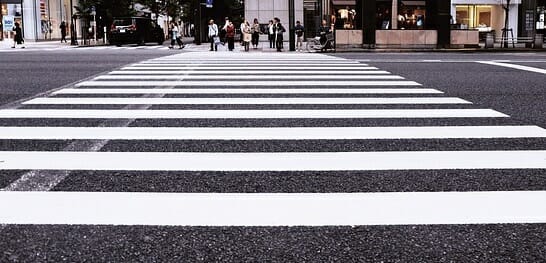
Common Causes of Pedestrian Parking Lot Accidents
As per the U.S. Centers for Disease Control and Prevention, more than 5,000 pedestrians are killed in motor vehicle collisions in the United States every year. About 130,000 others are treated in emergency rooms for non-fatal injuries. About one out of every four of such pedestrian accidents occur in parking lots and garages.
Although most vehicles travel at relatively low speeds in parking lots and garages, a pedestrian is still no match for a motor vehicle that weighs 3,500 pounds or even more. The pedestrian is virtually unprotected. There’s no protective steel barrier around a pedestrian. They don’t have seat belts or restraint systems either. Their crumple zones consist of their bones and joints. That’s why severe injuries or even death can result from a low speed impact. Here are just a few common causes for pedestrian parking lot accidents:
- Distracted driving like talking on a phone or texting while driving.
- Excessive vehicle speed.
- Both drivers and pedestrians failing to keep a proper lookout for each other.
- Drivers looking from side to side searching for a parking space and failing to see pedestrians
- Parking lots with poor traffic patterns.
- Parking lots without sidewalks, crosswalks or signage.
- Drivers entering or exiting parking spaces.
- Elderly drivers pressing the accelerator pedal rather than the brake pedal.
- Driving under the influence of alcohol or drugs.
Proving Liability
The police might investigate a parking lot accident, but tickets probably won’t be issued. That’s because these types of accidents almost always occur on private property. If no tickets are issued, that excludes the possibility of using a plea of guilty to a traffic offense against a driver. The claimant will then be required to rely on the common law elements of negligence. He or she will be required to prove the following elements:
- The driver owed a duty of care to the claimant.
- There was a breach of that duty.
- The breach of duty was the cause of the accident.
- The victim’s injuries were foreseeably and proximately caused by the accident.
- The victim suffered legally recognized damages like medical bills and lost earnings.
Here’s an example of how the law of negligence might be used in an accident that occurred in front of a Target store in Malvern last month. As with nearly all stores like Target, there’s a parking lot across the street from the store’s private road. The road travels perpendicular from the store’s entrance and exits, and customers must cross that road to get to and from their vehicles. A person who was crossing that road was hit outside of the store’s entrance. Police were called, and they investigated the accident, but no tickets were issued because the accident occurred on private property. Any personal injury case that spins off of the accident must be decided by the common law elements of negligence.
Comparative Negligence
Although the driver of the vehicle that hit a pedestrian in a parking lot or garage might bear the brunt of responsibility for an accident, the pedestrian might also have shared some responsibility. That’s when the law of comparative negligence factors into the damages equation.
Pennsylvania law allows the parties to agree upon or a jury to determine any negligence by the claimant. That’s factored into any final settlement or judgment. For example, if a gross award is $100,000, and the pedestrian in the parking lot is determined to be 25 percent at fault, the pedestrian’s net award would be $75,000. If the pedestrian is determined to be 51 percent or more at fault, he or she takes nothing.
Contact a Philadelphia Pedestrian Injury Lawyer
Whether accidents and injuries occur in a parking lot or inside of a Target store in or around Philadelphia, you’ll want to speak with an experienced Philadelphia pedestrian injury lawyer about the facts surrounding your accident and the nature and extent of your injuries. Just contact us by email or by calling us, and we can arrange for a free consultation and case review. Don’t give a statement of any kind to a Target representative. He or she could only try to use your own words against you in the future. Anything that you say to us is privileged and confidential. Contact us right away for that free consultation and case evaluation on any Target injury or parking lot injury.







